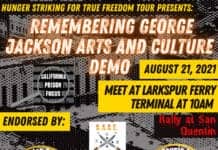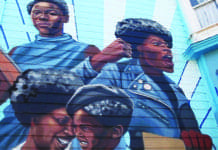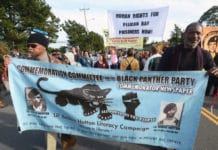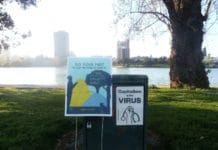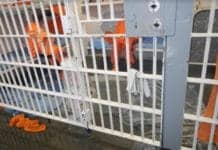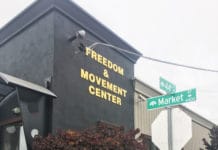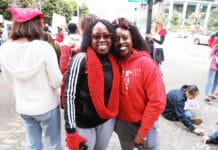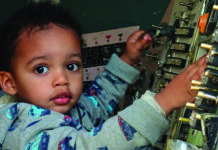by Wanda Sabir
This weekend my big sister passed. I found out last Monday, Sept. 30, 2013, that she was in the hospital, San Francisco General Hospital, with lung cancer. She’d been going into emergency for chest pain and problems breathing, but they treated the symptoms and didn’t notice the spots until recently when they kept her.
I didn’t know it was as serious as it was, so imagine my surprise when I get a text, two texts that she is gone. Genevieve Bayan, my big sister – gone.
She and I are both summer children – her birthday July 4. She made 60 this year.
Last night I went to the water where we washed her body. From New Orleans, there was a second line at Yerba Buena Gardens, which I joined in on at the finale – “Down Congo Line” by Dimensions Dance Theater. One of my favorite teachers and former principal joined me at the concert and performance. When the dancers came on stage in white, I knew this was for all those who’ve gone before, the named and the nameless.
Candles flickered behind the drummers and dancers on the altar.
I was in the right place. It was the right time. I could let her go here. The song, “I’ll Fly Away,” lifted her soul and she was gone.
Dressing in my ceremonial white with red beaded earrings (Masai) and a red beaded bracelet (Ndebele) and a red angel pin (Topsy dolls, South Africa) and black purse – the red, white and black are ancestor colors in the Yoruba tradition – was my way of letting the world know, those who know, that someone special was no longer with us.
I started to bring all white to Pacifica this week (I’m now a student at Pacifica Graduate Institute near Santa Barbara), but I decided to honor Mama Yemanja instead. She can hold the grief – her largess the ocean, Pacific, Atlantic, Indian. A friend asked why not the African Ocean? I didn’t have an answer, but the question certainly made a lot of sense.
Genevieve Bayan, my big sister – gone. I hope she wasn’t alone.
Yes, I am a Pan African blend of what works for me in any given moment (smile). So instead of sleeping, I was honoring Genevieve, because she will be in the ground before I return. I am here, so I will not be able to participate in her ceremonial washing – with special herbs and scents and prayers and woman stories.
I met Genny at 10 or 11; however, it wasn’t until I was a preteen that she allowed me to hang out with her and her friends, all older than me. I remember how she’d put her hands over my ears when she didn’t want me to hear something.
I just held my counsel and was rewarded with continued privileges. She was the only one I knew then who took me under her wing and let me hang with her. Motherless, I guess she knew what I needed and she shared her mother with me too. Many a day I was at Genny’s house kicked back on her patio, her mom in the parlor or den or kitchen. Their house was walking distance from Golden Gate Park. I was sorry to hear that Genny lost it to taxes.
She had had a stroke and ended up walking with a cane afterward. The stroke affected her memory and cognitive functioning. But she was still Genny, my big sister who encouraged me to publish and pursue higher education and be a fierce warrior for justice. I recall stories of resistance at Galileo High School in San Francisco, where she and her posse demanded Black studies in their school district.
She was the only one I knew then who took me under her wing and let me hang with her. Motherless, I guess she knew what I needed and she shared her mother with me too.
She would smile when reflecting on her Black Panther days. I don’t think she was a member; she just was cool with the revolutionaries like that. She told me about how Al Islam saved her life. I wish I could remember more of the details, but like I used to think my mother’s name was “Mama,” Genny was my sister, not a subject for a story, not an artifact for study. She was my sister and that was a feeling, not a tangible object.
She had me accompany her to New Medina, a community of American Muslims in Mississippi founded by Imam Warith Deen Mohammed, where she purchased land just outside Hattiesburg. The last time we were together it was at a Sweet Honey concert at Zellerbach and Alice Walker was in the audience. We were with recently released women prisoners and got to go backstage. In all the excitement, I forgot to tell Genny where we were going and I didn’t hear my phone ringing.
Yep, she was mad at me for months. Nothing I could say would get her to speak to me. We were going to go by Cafe Gratitude for a bite before heading home. I hate these loose ends death will not allow one to tie or knot or cut.
Genny was my sister, not a subject for a story, not an artifact for study. She was my sister and that was a feeling, not a tangible object.
Big sisters forgive their younger sisters, I know, because I have a little sister and a younger brother, two daughters and two grandchildren and many nieces and nephews. If there was no forgiveness in the world, our capacity as human beings would be diminished. So I pay it forward and ask another dear friend who left the rehabilitation center the day Genny died if I can run errands for him until he gets back on his feet – well, really on his seat. He is paralyzed.
I saw Brother Khalid at Genny’s funeral. He looked well. The funeral home was full of believers who wanted to ensure her ascension. I hadn’t known any of her family except her mother, Mrs. Kathleen Munson; a friend of mine said Genny’s mom was her kindergarten teacher – small world. Funny how life comes full circle at times like this. Sister Naimah and I were riding with Sister Nisaa to the cemetery in Half Moon Bay where Genny was laid to rest next to her mother.
Muslim funerals are really fast as in if you blink, you could miss it. Camisha Fatimah walked into the prayer that Friday morning at the funeral home with only a few takbirs or Allahu Akbars left. I met many of Genny’s extended family – cousins from Houston and Las Vegas, Berkeley and Livermore – as some of us prepared to drive to the cemetery.
On the lovely drive there, we reminisced about Genny, and later as we stood on the hill and her body was lowered into the hole, a mountain of soil nearby, people began grabbing a handful of dirt to throw on the carton that held her. I wasn’t sure if I was going to participate. This part of the ceremony is so final. Was she really gone? Was I never going to hear her chuckle or conspiratorial laugh as she prepared to tell me to do something?
The funeral home was full of believers who wanted to ensure her ascension.
At the ceremonial washing Wednesday, two days earlier, the sisters said she looked so peaceful and serene. I’d missed the temporal goodbye, so I was consoled with an opportunity to read a juz or thirtieth of the Qu’ran. The practice is to read the complete book before the person’s janazah or funeral prayer. I chose the 18th section, which included some of my favorite suras or chapters and ayats or verses: Chapter 23: Al-Mu’minun, The Believers; Chapter 24: An Nur, The Light; Chapter 25: Al-Furqan, the Discrimination. All fitting, I thought, for a woman whose chosen name meant she had no doubts, confirmed when I heard that her final words to Aminah Ali, her executor, were that she was ready and had no fear.
So as I finished reading the juz (pronounced “joose”), I saluted her and wished her well in my heart. The day of the Maafa Ritual 2013, Sunday, Oct. 13, 2013, when I called her name, a sister standing near me started crying. She hadn’t known Genny had taken her last breath two weeks ago. “I wondered why I hadn’t heard from her when I called,” she said.
I know Genny would want me to be here at Pacifica Graduate Institute, so I am here and so is she, since bodies have limits; however the soul is, well, everything.
So I am sad, yet happy. Ready and prepared to adjust to this new path at Pacifica. I am interested in ancestral memory and the effects of trauma on memory, specifically the ancestral memories of the formerly enslaved. I am also interested in the lives and wellbeing of today’s legal slave population: American prisoners, both juveniles and adults. I am a member of California Coalition for Women Prisoners.
Last week, Friday, Oct. 25, the Sista-to-Sista team visited women at Central California Women’s Facility. We arrived late and left late. There were just three of us: Hafsa Al-Amin, Sister Naimah Salahuddin and I. We each met with three women. I met with two sisters I have been visiting for years and a new woman. I was not feeling well and after the visit, the next day, I could not get out of the bed and have been sick since.
One sister you have heard me speak of is Patricia Wright, who has terminal cancer; she is now out of the wheelchair, approved for a transfer to the women’s prison in Southern California, where her children are. She wants to be near them since the governor doesn’t seem to be in a hurry to release her. Then there is Georgia Horton, who started a program seven years ago, “Girl Friend, What Happened? a course designed to ask women to look into their journey of life and ask themselves, ‘How have I arrived at the place I am now? What happened for me to get here?’”
Last week, Friday, Oct. 25, the Sista-to-Sista team visited women at Central California Women’s Facility.
She has been supporting this program with her own resources – money earned from cleaning toilets – to help women deal with trauma and addiction. I hadn’t realized until this week that when CDCR says that it approves a program, there are no resources attached to the project and so the women who develop these great programs that work – they have to volunteer or give their programs over to people who develop self-help programs and sell them to CDCR, then look for prisoners to fill the seats. It is not about rehabilitation. If it were, the programs developed from the inside out would be supported by the institution, which in its current structure can do nothing except allow the prisoners space and time – that’s all.
Then there is Georgia Horton, who started a program seven years ago, “Girl Friend, What Happened? a course designed to ask women to look into their journey of life and ask themselves, ‘How have I arrived at the place I am now? What happened for me to get here?’”
Georgia has refused to give her program away to interlopers, so I am going to sponsor her and look to in-kind support from organizations that have similar missions, like California Coalition for Women Prisoners, Legal Services for Prisoners with Children, All of Us or None, Critical Resistance, Prison Focus, Justice Now and others. Georgia needs stationary, pencils and pens, journals for the women. Each session is six weeks and she has about 120 women go through her program every 13 weeks. If anyone would like to sponsor this program, visit one of the weekly sessions, send resources, write Georgia Horton, W-33911, CCWF, 23370 Road 22, P.O. Box 1501, Chowchilla, CA 93610-1501.
Bay View Arts Editor Wanda Sabir can be reached at wsab1@aol.com. Visit her website at www.wandaspicks.com throughout the month for updates to Wanda’s Picks, her blog, photos and Wanda’s Picks Radio. Her shows are streamed live Wednesdays at 6-7 a.m. and Fridays at 8-10 a.m., can be heard by phone at (347) 237-4610 and are archived on the Afrikan Sistahs’ Media Network.

 Store
Store





